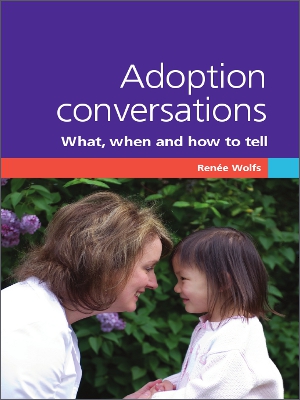
Adoption conversations
£13.95
When do I begin to tell my child about their adoption? Should I tell my child her birth mother was a drug addict? What do I do if my child is angry and says that we are not his real parents? How do I handle hurtful comments made by my child’s friends or other adults? How do I find out what my child is really going through inside? What exactly should we tell children about their adoption story? And at what age?
This in-depth practical guide, written by an adoptive parent for adoptive parents, explores the questions adopted children are likely to ask, with suggestions for helpful explanations and answers. Looking at different age groups in turn, the author provides a wealth of suggestions for possible dialogue with adopted children and age-appropriate answers to common questions and fears.
The author draws on the experiences of other adoptive parents, who provide a rich resource of case stories, scenarios, experiences and conversations. This invaluable guide contains many practical tips and will give adoptive parents the confidence with which to help children come to terms with their adoption-related grief and discuss the known (or unknown) aspects of their adopted child’s past.
Who is this book for?
Adoptive parents looking for advice and ideas on how to talk to their child about their adoption and help them understand their history and background.
Although the guide focuses primarily on the needs and questions of children adopted from abroad, the practical advice given is applicable to any adopted child.
What you will find in this book
The book covers the following:
- How and when to tell your child their adoption story
- Common fears children have about adoption
- Advice on sharing particularly difficult information with your child
- Useful conversation techniques, including naming and identifying feelings
- How to make a memory book or life story book
- How to help your child deal with adoption-related grief, sadness and anger
- How to respond to questions from your child, family and friends, and others in your community
Author
Renée Wolfs is a mother of three children adopted from China. She works as a freelance journalist, editor and author. Her personal involvement in adoption, coupled with her communication expertise and a knowledge of developmental psychology, led Renée to question what exactly children should be told about their adoption story, and at what age.
NOW AVAILABLE IN EBOOK AND HARD COPY
This title is now available in digital-only format for immediate access. Purchases are held in your own personalised online library and accessed via your browser or through the app on your phone or tablet.
Questions about eBooks? Check out our FAQs£13.95
Reviews
Renee Wolfs is the mother of three children adopted from China who shares, in this neat volume, her detailed knowledge and experience, views and ideas about exploring and responding to the complex questions that adopted children are commonly likely to ask. The book is helpful for parents/carers in that it does not simply explore theoretical concepts; it provides concrete suggestions with helpful explanations and potential responses and answers. The book confronts and does not judge complex issues, providing ideas about how to think about the factual information known and how to best present it to a child. The author also explores how adoptive parents may deal pragmatically with the reactions of strangers. This book is relevant not only to those who have chosen to adopt children but also for foster carers or for others who, for a number of reasons, are re-parenting children who have difficult or complex issues to bear or understand about their family of origin.
Elaine Rose, Psychotherapist and independent social worker, Seen and Heard 19:2
This is a fascinating book devoted to conversational skills and techniques applied to discussing adoptions. It is thoughtful and moving as well as practical and sensible. It is written by a mother of an adopted child, with adoptive parents in mind and contains thoughtful reflections upon her own experiences. However, I suspect that it will be welcomed by many clinicians too as it remains faithful to a developmentally sensitive perspective throughout. The author has consulted with experts in child development and adoption. It is packed full of examples of how to deal with specific issues at different stages of a child’s life. The examples give practical suggestions of how these conversations might go, and what kinds of questions a child might normally ask at different ages. The examples also serve to normalise potentially distressing questions and help parents to be prepared for them. I highly recommend this book, which fuses reflections on personal experience with good clinical advice, all set within a sound developmental framework.
Matthew Woolgar, CAFT Maudsley Hospital London, Child and Adolescent Mental Health
Aimed at adopted parents with lots of practical advice, but very much based on theory.
Five stars, Amazon.co.uk
